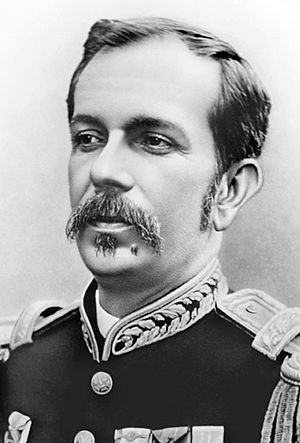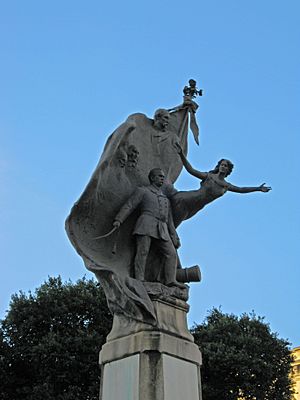Floriano Peixoto facts for kids
Quick facts for kids
His Excellency Marshal
Floriano Peixoto
|
|
|---|---|

Marshal Floriano in 1891
|
|
| 2nd President of Brazil | |
| In office 23 November 1891 – 14 November 1894 |
|
| Vice President | Manuel Vitorino |
| Preceded by | Deodoro da Fonseca |
| Succeeded by | Prudente de Morais |
| 1st Vice President of Brazil | |
| In office 26 February 1891 – 23 November 1891 |
|
| President | Deodoro da Fonseca |
| Preceded by | Position established |
| Succeeded by | Manuel Vitorino |
| Minister of War | |
| In office 19 April 1890 – 22 January 1891 |
|
| President | Deodoro da Fonseca |
| Preceded by | Eduardo Wandenkolk |
| Succeeded by | Falcão da Frota |
| President of the Mato Grosso Province | |
| In office 13 September 1884 – 5 October 1885 |
|
| Monarch | Pedro II |
| Preceded by | Baron of Batovi |
| Succeeded by | Ramos Ferreira |
| Personal details | |
| Born | 30 April 1839 Maceió, Alagoas, Empire of Brazil |
| Died | 29 July 1895 (aged 56) Barra Mansa, Rio de Janeiro, Brazil |
| Political party | Independent |
| Spouse |
Josina Peixoto
(m. 1872) |
| Signature | |
| Nickname | The Iron Marshal |
| Military service | |
| Allegiance | |
| Branch/service | |
| Years of service | 1861–1889 |
| Rank | Field Marshal |
| Battles/wars | Paraguayan War |
Floriano Vieira Peixoto ( 30 April 1839 – 29 July 1895), born in (today a district of the city of Maceió in the State of Alagoas), nicknamed the "Iron Marshal", was a Brazilian soldier and politician, a veteran of the Paraguayan War, and the second President of Brazil. He is the first Vice President of Brazil to have succeeded a former President mid-term.
Contents
Election
Peixoto was an army marshal when elected vice-president in February 1891. In November 1891, he rose to the presidency after the resignation of Marshal Deodoro da Fonseca, the first president of Brazil. Peixoto came to the presidency in a difficult period of the new Brazilian Republic, which was in the midst of a general political and economic crisis made worse by the effects of the bursting of the Encilhamento economic bubble. As Vice President, he had also served as the President of the Senate.
Presidency
His government was marked by several revolutions. Ruling in an authoritarian fashion, Peixoto defeated a naval officers' rebellion against him in 1893–1894 and a seditious military movement in the States of Rio Grande do Sul and Santa Catarina during the same years. His government was marked by an increased centralization of power and nationalism, with the florianista cult of personality being the first phenomenon of a favorable political expression towards a republican politician in Brazil.
Legacy
He is often referred to as "the Consolidator of the Republic" or "The Iron Marshal." He left the presidency on 15 November 1894. In spite of his unpopularity, he was responsible for the consolidation of the new republican government.
Desterro, the capital of the state of Santa Catarina, was renamed Florianópolis after its defeat by loyalist troops at the end of the Federalist Riograndense Revolution.
See also
 In Spanish: Floriano Peixoto para niños
In Spanish: Floriano Peixoto para niños


